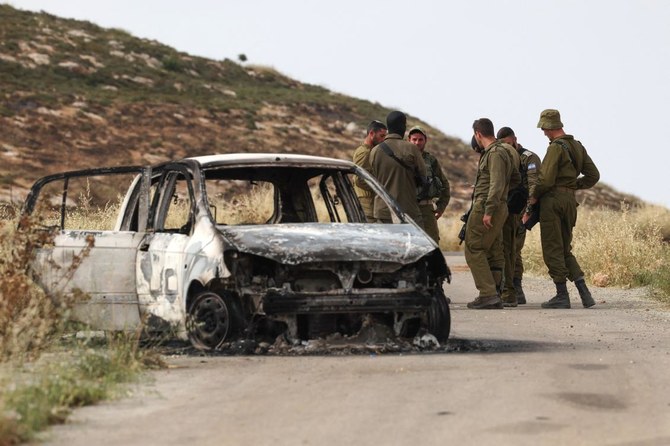RAMALLAH: A Palestinian security officer, who was soon due to be married, has been killed during clashes on Monday with Israeli forces in the occupied West Bank flashpoint city of Jenin.
The death of 37-year-old Ashraf Ibrahim, reported by Palestinian health officials, took the number of people estimated to have been killed by the Israeli army and settlers since the beginning of the year to 158, including 36 from the Gaza Strip in May, and 26 children.
Eight people were also injured in the latest of now almost daily Israeli offensives in Jenin and its camp.
Thousands of people attended the funeral of Ibrahim, a colonel in the Palestinian General Intelligence Service who had spent 11 years in Israeli prisons before joining the Palestinian Authority agency.
In a statement, the Hamas movement said: “Our steadfast and heroic people will make the occupation’s crimes a nightmare for its soldiers and settlers.”
More than 10 Palestinian security officers have been killed, dozens arrested, and several remain in detention, since the start of Israel’s military operation in the West Bank in early March last year.
Retired Maj. Gen. Adnan Al-Damiri, a former spokesman for the Palestinian security services, told Arab News that the Israeli army regularly targeted Palestinian security officers.
He said: “What is the fault of the Palestinian security officer who lives next to someone the Israeli army wants to be killed? The message to them is that they will be killed irrespective of whether they fight or do not fight the Israeli army.”
Some Palestinian leaders believe the security clampdown in the West Bank is a ploy by Israel to force Palestinian President Mahmoud Abbas to accept a meeting with Israeli Prime Minister Benjamin Netanyahu to arrange temporary solutions instead of tackling key issues such as Jerusalem, refugees, and borders.
A Palestinian security officer with the rank of colonel, who wished to remain anonymous, told Arab News: “If we cannot protect ourselves and the lives of our colleagues, how can we provide security for our security tasks and our people?”
He said that the actions of the Israelis had damaged the Palestinian security services’ credibility with the public and its ability to cooperate with Israel on almost any matter.
“How can a Palestinian security officer work in such an environment? We are suffering from a psychological, operational, professional, and financial crisis,” he added.
The number of Palestinians arrested by the Israeli army and being held in administrative detention without trial had reportedly reached 1,200.
Also, on Monday, Jewish settlers in the West Bank said they had set up a religious school in a dismantled outpost after the Israeli government lifted a ban on settlements in several evacuated areas in the northern part of the territory.
The US State Department said re-establishing the school contradicted commitments made by the Netanyahu government.
The school was built in Homesh, one of four West Bank outposts abandoned as part of Israel’s 2005 withdrawal from the Gaza Strip.
Homesh has been at the center of settler efforts to strengthen Israel’s hold on the northern West Bank. Homesh settlers also burned palm trees in the town of Burqa, northwest of Nablus.
The Israeli Knesset recently approved the cancellation of a disengagement bill from the areas of the northern West Bank, effectively making the outpost legal and officially free to be transformed into a settlement.
Settler attacks have also increased against Palestinian Christians in Jerusalem since the beginning of the year. Churches, monasteries, and cemeteries have been stormed, and in the latest incident on Sunday, verbal insults were directed at Christians in the Old City of Jerusalem.
Tombstones and crosses of more than 30 graves in the Protestant cemetery have also been destroyed.


























